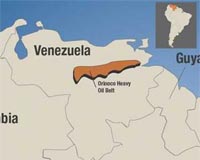 |
Riyadh (AFP) Feb 15, 2010 Saudi Arabia on Monday played down suggestions it could encourage China not to block sanctions against Iran over its nuclear programme by giving Beijing oil supply guarantees. Saudi Foreign Minister Saud al-Faisal said after talks with US Secretary of State Hillary Clinton that Beijing needed no prodding from Riyadh over how to deal with Iran in the UN Security Council. The Chinese "carry their responsibility" as one of the major world powers and "they need no suggestion from Saudi Arabia to do what they ought to do," Prince Saud said at a joint news conference with Clinton. He was questioned about suggestions that Saudi Arabia could provide oil supply guarantees to China to win Beijing's support for sanctions sought by Washington against Iran over its controversial nuclear programme. "Sanctions are a long-term solution (but) ... we see the issue in the shorter term because we are closer to the threat," Prince Saud said. "If we want security for the region, it requires an Iran at peace and happy with themselves," he added. Clinton said that "increasingly, more and more aspects of Iranian society ... are being controlled not by the clerical leadership, not by the political leadership" but by the Revolutionary Guards. She warned earlier that Iran was turning into a "military dictatorship" bent on building a nuclear bomb. Clinton held more than four hours of private talks with King Abdullah at his desert camp 60 miles (35 miles) northeast of Riyadh, aiming to rally support for tough new UN sanctions against Iran. Ahead of her talks with Prince Saud and the king, aides said she would press Saudi leaders to use their influence with China to secure a change of heart on sanctions against Iran over its controversial nuclear programme. China appears to be the strongest holdout to sanctions among the five veto-wielding permanent members of the UN Security Council. Clinton's top assistant for the Middle East, Jeffrey Feltman, told reporters travelling with her that China had an "important trading relationship" with the Saudi oil kingpin. "We would expect them (the Saudis) ... to use their relationship in ways that can help increase the pressure that Iran feels," said Feltman, the assistant secretary of state for Near East Affairs. Speaking to students earlier on Monday in Qatar, Clinton said the whole region had reason to fear Iran's nuclear programme and the growing influence of the elite Revolutionary Guards. Clinton said the United States was not aiming to use military action to curb Iran's nuclear ambitions but rather seeking to build support for tough new sanctions at the UN Security Council. She said the package Washington wanted adopted "will be particularly aimed at those enterprises controlled by the Iranian Revolutionary Guard, which we believe is in effect supplanting the government of Iran. "We see the government of Iran, the supreme leader, the president, the parliament is being supplanted and Iran is moving toward a military dictatorship," she said. "They are in charge of the nuclear programme." Saudi leaders were also expected to raise the Middle East peace process in their talks with Clinton amid growing frustration with the failure of US efforts to secure a relaunch of talks. Israeli-Palestinian negotiations have been frozen since Israel launched its devastating offensive against Gaza in December 2008. "The peace process is the main issue, of course," said Saudi foreign ministry spokesman Osama Nugali. "Our position is still the same ... that we need to revive the peace process." In Qatar, Clinton said she was optimistic that talks would resume this year. "I'm hopeful that this year will see the commencement of serious negotiations," she said. The White House, meanwhile, announced that US Vice President Joe Biden will tour the Middle East in early March with stops in Israel, the Palestinian territories, Egypt and Jordan. Clinton travelled on to the Saudi Red Sea city of Jeddah where she was to wrap up here Gulf mini-tour on Tuesday by meeting the head of the Organisation of the Islamic Conference.
Share This Article With Planet Earth
Related Links Powering The World in the 21st Century at Energy-Daily.com
 Venezuela awards Orinoco Belt blocks
Venezuela awards Orinoco Belt blocksCaracas, Venezuela (UPI) Feb 12, 2009 Venezuela on Wednesday awarded oil blocks in its massive Orinoco Belt to two groups led by Chevron and Spain's Repsol YPF, signaling a turnaround by President Hugo Chavez, who nationalized the energy sector in 2007. It was the first oil auction since Chavez took office 11 years ago. Chevron, Mitsubishi Corp., Inpex Corp. and Suelopetrol CA will take a combined 40 percent stake in ... read more |
|
| The content herein, unless otherwise known to be public domain, are Copyright 1995-2010 - SpaceDaily. AFP and UPI Wire Stories are copyright Agence France-Presse and United Press International. ESA Portal Reports are copyright European Space Agency. All NASA sourced material is public domain. Additional copyrights may apply in whole or part to other bona fide parties. Advertising does not imply endorsement,agreement or approval of any opinions, statements or information provided by SpaceDaily on any Web page published or hosted by SpaceDaily. Privacy Statement |